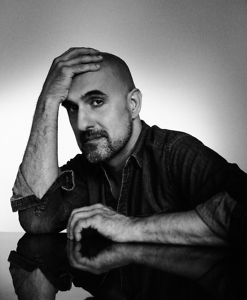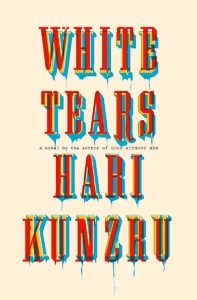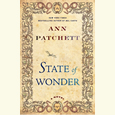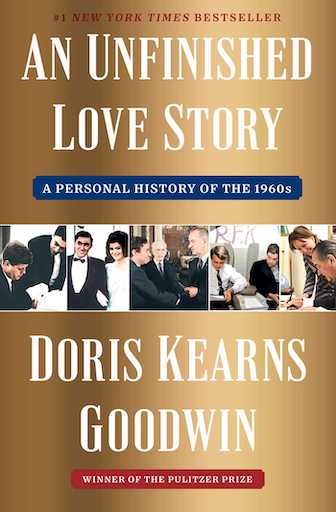Echoes and Disaster
In White Tears, Hari Kunzru summons up the voices of early American blues and its ghosts
Guglielmo Marconi, the Italian inventor who sent the first radio message, claimed that sound waves never die. In Hari Kunzru’s propulsive and complex ghost story, White Tears, the vanished sounds of the past aren’t just made audible; they come to haunt the novel with serious moral urgency, bringing issues of racial injustice and privilege to the fore. “If Marconi was right and certain phenomena persist through time, then secrets are being told continuously at the edge of perception,” says Seth, the novel’s primary narrator. “All secrets, always being told.”

At first Seth’s not listening for repressed secrets from the past. He’s just interested in sound. In the novel’s opening scene, he is a twenty-five-year-old white hipster wandering Manhattan, recording the city’s noises: “People and places. Sidewalk smokers, lovers’ quarrels, drug deals. I wanted to store the world and play it back just as I’d found it, without change or addition.” The act of recording people who don’t know they’re being recorded could be considered an act of power, of course, a type of appropriation. But Seth believes he is acting only from a desire for truth.
That quest for the authentic is part of what draws middle-class Seth to Carter, a trust-fund kid whose sprawling family business includes a private prison conglomerate, among other interests. Seth and Carter meet at college and bond over their love of music. Before falling under Carter’s influence, Seth tried to avoid music from the past, afraid he would hear echoes from the dark places of human history. But Carter seeks out those echoes, hearing in the suffering of African Americans something truer than his own privileged existence. “Carter taught me to worship—it’s not too strong a word—what he worshipped,” Seth says. “He listened exclusively to black music because, he said, it was more intense and authentic than anything made by white people.”
After college, Carter and Seth start a recording studio, which they use to fabricate what seems to them like authenticity. “There are ways you can use a studio,” Seth says. “Things you can do that open up impossible spaces in the mind. You can put the listener in a room that doesn’t exist, that shouldn’t exist. You can put them in an impossible room.”
The novel’s momentum and creative daring really take off when impossible spaces start to open up in the minds of Seth and Carter. One day, listening to his street recordings, Seth hears a blues song he doesn’t remember hearing as he walked around Washington Square Park. Seth’s wary of the hypnotic song, but Carter becomes obsessed with it, altering the audio to make the found fragment sound like a 1920s blues record. Then he posts the clip online, claiming it’s from a 1928 recording by a musician named Charlie Shaw, a name he thinks he simply made up. The record-collecting blues aficionados of the Internet are convinced the audio is genuine—JumpJim, one of the collectors, even claims to have heard Charlie Shaw back in 1959.
 JumpJim’s knowledge of blues records is encyclopedic, especially compared to what he knows about actual blues artists, African-Americans whose lives have largely been forgotten. “Patton, Son House, Willie McTell, Robert Johnson, Willie Johnson, Skip James, John Hurt . . . The names were traded by collectors but no one seemed to know a thing about them,” he tells Seth. “No information, not a scrap. They were like ghosts at the edge of the American consciousness.” As the novel’s perspective widens, the borders of time itself grow fuzzy, and those ghosts begin to make themselves heard and felt. Seth’s own life seems more and more ghostly as the vanished Charlie Shaw becomes more and more present.
JumpJim’s knowledge of blues records is encyclopedic, especially compared to what he knows about actual blues artists, African-Americans whose lives have largely been forgotten. “Patton, Son House, Willie McTell, Robert Johnson, Willie Johnson, Skip James, John Hurt . . . The names were traded by collectors but no one seemed to know a thing about them,” he tells Seth. “No information, not a scrap. They were like ghosts at the edge of the American consciousness.” As the novel’s perspective widens, the borders of time itself grow fuzzy, and those ghosts begin to make themselves heard and felt. Seth’s own life seems more and more ghostly as the vanished Charlie Shaw becomes more and more present.
In its interest in the lines between past and present, White Tears plays with its own sort of polyphonic sound; repetitions of violence and doubled hauntings create an eerie harmony. As the novel picks up speed, even the present tense and the past tense begin to blend into an uncomfortable melody that only adds to the novel’s terror, particularly once Seth tries to escape what he hears as the voice of Charlie Shaw: “My only hope is to outrun him. To outrun him, but I was always slipping into the past.”
There’s something narratively familiar about Seth, the shy, geeky sidekick-turned-narrator, and about Carter, the angsty trust-fund kid, but it’s a familiarity that feels more archetypal than stereotypical. Here’s Seth discussing the way studio production can make musicians sound bigger than themselves, timeless: “The present is dry, but add reverb and you can hear time reverse its flow, slipping on into the past, into echo and disaster. It’s a trick, usually, just clever technique, except when it’s not.” The reverb Kunzru creates by colliding voices from different eras is no trick—and it makes White Tears a novel filled with echo and disaster that feels alarmingly, crucially present.

Lee Conell’s fiction has appeared in places like Kenyon Review, Guernica, Glimmer Train, and American Short Fiction. She earned her M.F.A. at Vanderbilt University, and her debut story collection, Subcortical, will be published in November 2017 by the Johns Hopkins University Press. She lives in Nashville.


